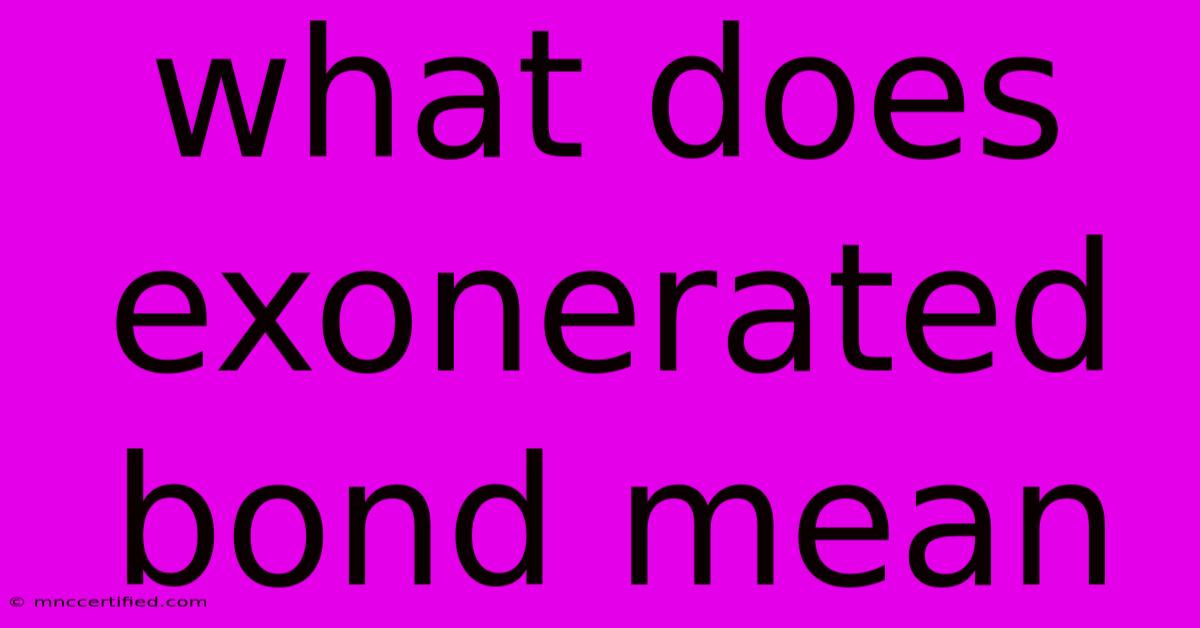What Does Exonerated Bond Mean

Table of Contents
What Does Exonerated Bond Mean? A Comprehensive Guide
Understanding legal terminology can be challenging, especially when dealing with complex financial situations. One such term that often causes confusion is "exonerated bond." This guide will thoroughly explain what it means, the process involved, and the implications for all parties concerned.
Understanding the Basics: Bonds and Their Purpose
Before diving into exonerated bonds, let's clarify what a bond is. Simply put, a bond is a financial guarantee provided by a surety (often a bonding company) to ensure that an individual or entity fulfills a specific obligation. These obligations can vary greatly, from fulfilling a contract to appearing in court. The bond protects the obligee (the party receiving the guarantee) from financial loss if the principal (the individual or entity obligated) fails to meet their commitment.
Types of Bonds and Their Obligations
Several types of bonds exist, each serving a different purpose:
- Fidelity Bonds: Protect against employee theft or dishonesty.
- Contract Bonds: Guarantee the completion of a construction project or other contractual agreements.
- Court Bonds: Secure the appearance of a defendant in court or the payment of a judgment.
- License and Permit Bonds: Ensure compliance with regulations and licensing requirements.
The specific conditions and obligations outlined in a bond agreement are crucial and vary depending on its type.
What Does "Exonerated Bond" Mean?
An exonerated bond signifies that the surety (the bonding company) has been released from its financial responsibility under the bond. This happens when the principal has fully met all obligations specified in the bond agreement, thus rendering the bond no longer necessary. In essence, the bond has served its purpose and is effectively discharged.
The Exoneration Process: Key Steps
The process of exonerating a bond typically involves several steps:
-
Fulfillment of Obligations: The principal must completely fulfill all obligations stated in the bond agreement. This might involve completing a project, paying a debt, or fulfilling any other stipulated conditions.
-
Verification and Documentation: The obligee needs to verify that the principal has indeed met all requirements. This often entails providing thorough documentation, such as project completion certificates, proof of payment, or court records.
-
Formal Request for Exoneration: The obligee then formally requests the surety to exonerate the bond. This usually involves submitting the necessary documentation to the surety company.
-
Surety's Review and Approval: The surety reviews the submitted documentation to confirm the principal's compliance. Once satisfied, they issue a formal release, exonerating the bond.
-
Release of Collateral (if applicable): If any collateral was pledged as security for the bond, it will typically be returned to the principal upon exoneration.
Implications of an Exonerated Bond
The exoneration of a bond has significant legal and financial implications:
-
Release from Liability: The surety is entirely released from any further financial responsibility under the bond. They are no longer liable for any potential breaches or defaults by the principal.
-
Closure of the Bond: The bond is officially closed, and the associated file is typically archived.
-
Restoration of Credit: For the principal, the successful completion of the bond obligations and subsequent exoneration can positively impact their creditworthiness, showcasing their reliability and ability to fulfill their commitments.
Common Misconceptions about Exonerated Bonds
It's crucial to address some common misconceptions:
-
Exoneration ≠ Cancellation: While both processes terminate the bond's active status, cancellation may occur before fulfillment of obligations, potentially leaving the principal with negative consequences. Exoneration, conversely, follows successful fulfillment.
-
Automatic Exoneration: Exoneration is not automatic. It requires a formal process with proper documentation and confirmation from both the obligee and the surety.
Conclusion: Seeking Professional Advice
Understanding the intricacies of exonerated bonds requires careful attention to detail and a clear comprehension of legal terminology. If you face a situation involving a bond, seeking guidance from legal professionals or experienced bond specialists is highly recommended to ensure compliance and avoid potential pitfalls. This expert advice can help navigate the process efficiently and protect your interests.

Thank you for visiting our website wich cover about What Does Exonerated Bond Mean. We hope the information provided has been useful to you. Feel free to contact us if you have any questions or need further assistance. See you next time and dont miss to bookmark.
Featured Posts
-
10 000 Surety Bond For Notary
Nov 26, 2024
-
Gha 1 3 Nas Al Gharafa Vs Al Nassr
Nov 26, 2024
-
Thanksgiving Snow Is It Likely
Nov 26, 2024
-
Drake Claims Inflated Streams For Kendrick Lamar
Nov 26, 2024
-
Horak Insurance Washington Iowa
Nov 26, 2024